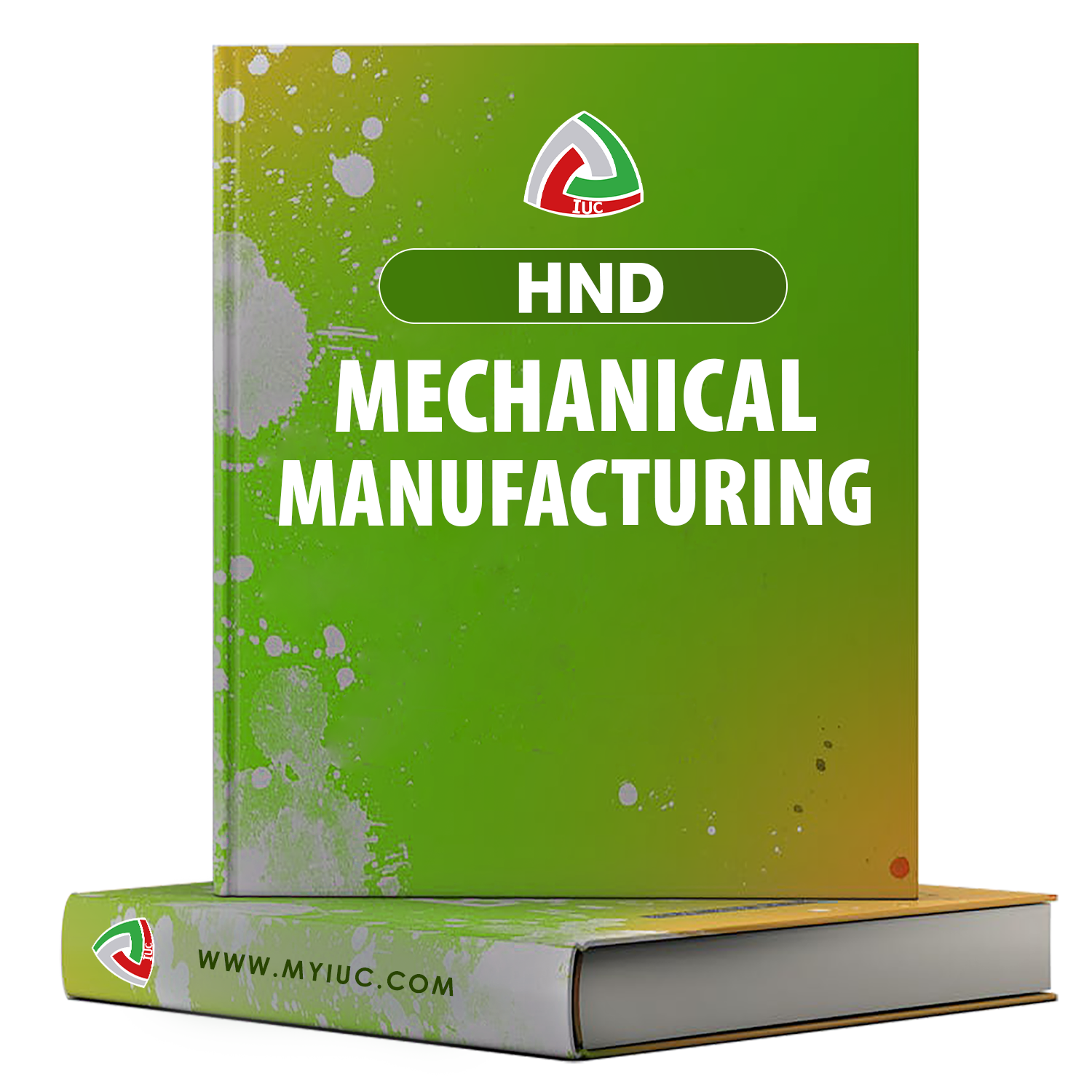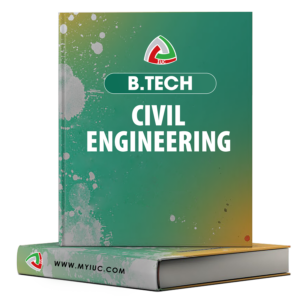The HND in Mechanical Manufacturing program is designed to provide students with a strong foundation in mechanical engineering principles, manufacturing processes, and production systems. The curriculum focuses on the design, operation, and optimization of manufacturing systems, with an emphasis on advanced technologies, materials, automation, and quality control. Students gain the skills necessary to contribute to the development and improvement of manufacturing processes in a wide range of industries, from automotive and aerospace to consumer electronics and heavy machinery.
| PROGRAMME |
SEMESTRE |
DURATION |
CREDIT |
PARTNER INSTITUTION |
ACCREDITATION |
| MECHANICAL MANUFACTURING |
4 SEMESTERS |
2 YEARS |
120 |
MINESUP |
|
CORE OBJECTIVES
1. Fundamentals of Mechanical Engineering
- – Mechanical Design : Provide students with the knowledge of fundamental mechanical design principles, including the use of CAD (Computer-Aided Design) software, material selection, and structural analysis to create efficient and durable designs.
- – Materials Science : Equip students with an understanding of materials properties, including metals, polymers, and composites, and their application in manufacturing processes.
- – Thermodynamics and Fluid Mechanics : Teach students the principles of thermodynamics and fluid mechanics, focusing on how these principles are applied in mechanical systems and manufacturing processes.
2. Manufacturing Processes and Techniques
- – Casting, Molding, and Forging : Teach students various manufacturing techniques, including casting, molding, and forging, which are fundamental to creating metal and polymer parts.
- – Machining and CNC : Provide in-depth knowledge of machining processes, including turning, milling, drilling, and grinding, and introduce students to computer numerical control (CNC) technology.
- – Welding and Fabrication : Train students in various welding techniques, such as MIG, TIG, and arc welding, as well as metal fabrication methods used in manufacturing operations.
- – Additive Manufacturing : Introduce the concepts and technologies of 3D printing and additive manufacturing, focusing on its application in prototype development and production systems.
3. Manufacturing Automation and Robotics
- – Industrial Automation : Equip students with knowledge of automated systems in manufacturing environments, including robotics, programmable logic controllers (PLCs), and automated material handling systems.
- – Robotics in Manufacturing : Teach students how robots are used in modern manufacturing for tasks such as assembly, material handling, and quality control, and how to integrate robots into manufacturing systems.
- – Control Systems : Introduce students to the principles of control systems in manufacturing, including the use of sensors, actuators, and controllers for process optimization and automation.
4. Quality Control and Assurance
- – Quality Management Systems (QMS) : Provide students with an understanding of industry-standard quality management systems such as ISO 9001, focusing on their application in manufacturing operations.
- – Statistical Process Control (SPC) : Teach students how to apply statistical methods to monitor and control manufacturing processes, ensuring product consistency and quality.
- – Inspection and Testing : Equip students with the skills to conduct various types of inspections and tests, including dimensional analysis, non-destructive testing (NDT), and performance testing, to ensure product quality meets specifications.
5. Manufacturing Materials and Sustainability
- – Sustainable Manufacturing : Introduce the concept of sustainability in manufacturing, focusing on reducing waste, energy consumption, and environmental impact through efficient processes and the use of green technologies.
- – Material Recycling and Reuse : Teach students the importance of recycling materials in manufacturing and explore technologies and processes for reusing materials in production systems.
- – Green Manufacturing Technologies : Equip students with knowledge of environmentally friendly manufacturing technologies, such as energy-efficient equipment and sustainable material sourcing.
6. Production Planning and Control
- – Production Systems and Layout Design : Provide an understanding of different production systems, such as batch, continuous, and discrete manufacturing, and teach students how to design efficient factory layouts to optimize production flows.
- – Inventory Management : Equip students with skills in managing raw materials and finished goods inventories, focusing on techniques like Just-in-Time (JIT) and Material Requirements Planning (MRP) to minimize waste and ensure timely production.
- – Supply Chain Management : Teach students how to manage and optimize the supply chain, focusing on procurement, logistics, and distribution strategies to ensure smooth manufacturing operations.
7. Maintenance and Reliability Engineering
- – Preventive and Predictive Maintenance : Provide students with knowledge of maintenance strategies, including preventive and predictive maintenance, to improve the reliability and lifespan of manufacturing equipment.
- – Reliability Engineering : Teach students the principles of reliability engineering, focusing on how to design and maintain manufacturing systems that are reliable, efficient, and cost-effective.
- – Troubleshooting and Diagnostics : Equip students with practical skills in diagnosing and troubleshooting mechanical failures, helping to ensure minimal downtime in manufacturing processes.
8. Health, Safety, and Risk Management
- – Occupational Health and Safety : Teach students about workplace safety standards, including hazard identification, risk assessment, and the implementation of safety protocols in manufacturing environments.
- – Risk Management : Equip students with the skills to identify potential risks in manufacturing processes and implement strategies to mitigate those risks, ensuring the safety of personnel and the protection of equipment.
- – Environmental Health and Safety (EHS) : Provide knowledge on environmental protection practices and regulations, including waste management, emissions control, and compliance with environmental laws.
9. Project Management and Leadership Skills
- – Project Management : Introduce students to project management principles, including planning, scheduling, budgeting, and risk management, to help them manage manufacturing projects efficiently.
- – Leadership and Teamwork : Teach students how to lead teams in manufacturing settings, focusing on effective communication, conflict resolution, and decision-making skills.
- – Lean Manufacturing and Continuous Improvement : Equip students with knowledge of lean manufacturing principles, focusing on eliminating waste and optimizing processes for continuous improvement.
10. Professional Development and Career Preparation
- – Internships and Practical Experience : Provide students with the opportunity to gain hands-on experience in real manufacturing environments through internships or work placements, helping them apply theoretical knowledge to practical scenarios.
- – Industry Certifications : Guide students in preparing for industry-recognized certifications, such as Six Sigma, Lean Manufacturing, and OSHA certifications, to enhance their employability.
- – Career Services and Networking : Offer career counseling, resume-building support, and networking opportunities with professionals in mechanical manufacturing to help students transition to successful careers.
CAREER OPPORTUNITIES
1. Mechanical Manufacturing Engineer
- – Design and Optimize Manufacturing Processes : Focus on improving efficiency, reducing costs, and ensuring product quality.
2. Production Planner
- – Develop and Manage Production Schedules : Coordinate the supply of raw materials and ensure that manufacturing operations meet deadlines and quality standards.
3. Quality Control Inspector
- – Inspect and Test Products and Materials : Check at various stages of production to ensure they meet the required specifications and quality standards.
4. CNC Programmer/Operator
- – Program and Operate CNC Machines : Fabricate complex parts and components used in various industries, including aerospace, automotive, and electronics.
5. Welding Engineer
- – Oversee Welding Processes and Operations : Ensure welding methods meet industry standards and that welded products are durable and safe.
6. Manufacturing Systems Analyst
- – Analyze and Optimize Manufacturing Systems : Focus on increasing efficiency, reducing waste, and improving product throughput.
7. Maintenance Engineer
- – Design and Implement Maintenance Strategies : Ensure minimal downtime and optimize the lifespan of machinery.
8. Project Manager (Manufacturing)
- – Manage Manufacturing Projects : Plan, budget, and coordinate resources, ensuring that projects are completed on time and within budget.
9. Lean Manufacturing Specialist
- – Implement Lean Manufacturing Techniques : Eliminate waste, streamline production processes, and improve overall efficiency in manufacturing operations.
10. Supply Chain Manager
- – Oversee the Supply Chain Process : Manage raw material procurement to product distribution, ensuring smooth and efficient manufacturing operations.



